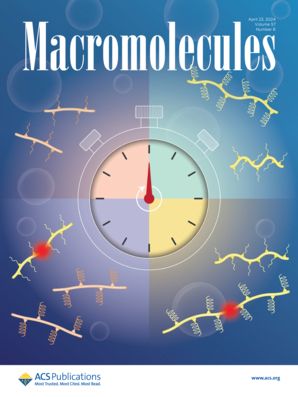Accelerated ReaxFF Simulations of Vitrimers with Dynamic Covalent Adaptive Networks
IF 5.1
1区 化学
Q1 POLYMER SCIENCE
引用次数: 0
Abstract
Vitrimers are a novel class of sustainable polymers with dynamic covalent adaptive networks driven by bond-exchange reactions between different constituents, making vitrimers reprocessable and recyclable. Current modeling approaches of bond-exchange reactions fall short in realistically capturing the complete reaction pathways, which limits our understanding of the viscoelastic properties of vitrimers. This research addresses these limitations by extending and employing the Accelerated reactive molecular dynamics (ReaxFF) technique, thus enabling a more accurate representation of vitrimer viscoelastic behavior at the molecular level. Bayesian optimization is employed to select force field parameters within the Accelerated ReaxFF framework, and an empirical function is proposed to model temperature dependence, thereby controlling the reaction probabilities under varying temperatures. The extended framework is employed to simulate nonisothermal creep behavior of vitrimers under different applied stress levels, heating rates, and numbers of reactions. The simulation results agree with experimental findings in the literature, validating the robustness of the framework.

求助全文
约1分钟内获得全文
求助全文
来源期刊

Macromolecules
工程技术-高分子科学
CiteScore
9.30
自引率
16.40%
发文量
942
审稿时长
2 months
期刊介绍:
Macromolecules publishes original, fundamental, and impactful research on all aspects of polymer science. Topics of interest include synthesis (e.g., controlled polymerizations, polymerization catalysis, post polymerization modification, new monomer structures and polymer architectures, and polymerization mechanisms/kinetics analysis); phase behavior, thermodynamics, dynamic, and ordering/disordering phenomena (e.g., self-assembly, gelation, crystallization, solution/melt/solid-state characteristics); structure and properties (e.g., mechanical and rheological properties, surface/interfacial characteristics, electronic and transport properties); new state of the art characterization (e.g., spectroscopy, scattering, microscopy, rheology), simulation (e.g., Monte Carlo, molecular dynamics, multi-scale/coarse-grained modeling), and theoretical methods. Renewable/sustainable polymers, polymer networks, responsive polymers, electro-, magneto- and opto-active macromolecules, inorganic polymers, charge-transporting polymers (ion-containing, semiconducting, and conducting), nanostructured polymers, and polymer composites are also of interest. Typical papers published in Macromolecules showcase important and innovative concepts, experimental methods/observations, and theoretical/computational approaches that demonstrate a fundamental advance in the understanding of polymers.
 求助内容:
求助内容: 应助结果提醒方式:
应助结果提醒方式:


